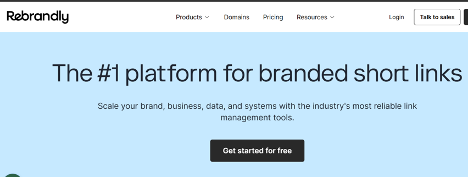Short URLs, or shortened web addresses, are an essential tool in digital communication, widely used across social media, email marketing, and other online platforms. They enable users to share long and cumbersome URLs in a much more compact form, making it easier to track and manage links. As the internet continues to evolve, short URL technology will also advance. Let’s explore the future trends in this space, delving into how they will impact businesses, marketers, and everyday users alike.
1. Integration with Smart Technology
As the use of smart devices, including smartphones, tablets, and even smart TVs, increases, short URLs will play an integral role in facilitating seamless interactions across platforms. The demand for quick access to information has never been higher, and short URLs offer a simple solution to this.
In the future, short URL technology will likely become integrated into voice-activated assistants, such as Amazon Alexa or Google Assistant, allowing users to access websites or apps by simply saying a short URL. Imagine asking your smart device to open a link to a recipe or a news article, and the assistant instantly retrieving it through a short URL.
Moreover, as smart devices become more interconnected in the Internet of Things (IoT) ecosystem, short URLs could play a critical role in connecting various devices. These shortened URLs will likely be used for device-to-device communication, facilitating quick data transfer or triggering specific actions.
2. Enhanced Analytics and Data Tracking
As businesses and digital marketers continue to focus on data-driven strategies, short URL technology will evolve to provide more advanced analytics. Right now, many URL shorteners offer basic tracking features, such as the number of clicks, geographic location of users, and devices used. However, as big data and machine learning become more prominent, we can expect short URL services to offer more granular insights.
The future of short URLs will likely include more detailed analytics, such as user behavior analysis, A/B testing for URL optimization, and even real-time data processing. Marketers could gain insights into how users interact with specific content, allowing them to tailor campaigns more effectively.
Moreover, by integrating artificial intelligence (AI) with URL shortening, predictive models could be used to predict which links are most likely to perform well. This data-driven approach would allow companies to refine their content distribution strategies, ensuring maximum impact.
3. Increased Security Features
With the growth of cybersecurity threats, there is a significant need for short URL services to incorporate better security features. Shortened URLs, while convenient, can also be misused for malicious purposes, such as phishing attacks. In the future, short URL providers are likely to implement more robust security measures to prevent such abuses.
One possible trend is the implementation of encryption and secure link expiration. By adding encryption protocols to short URLs, providers can ensure that only authorized users can access the link. Additionally, expiration dates on short URLs could limit the time a link remains active, adding another layer of security for sensitive information.
Another security measure could involve the ability to verify the authenticity of a link before it is shared. This feature would help prevent malicious actors from disguising harmful content with seemingly harmless shortened URLs.
4. Custom Short URLs for Branding and Personalization
Personalized URLs are already gaining popularity, and this trend will only accelerate in the coming years. Today, many businesses and content creators use custom short URLs to maintain brand identity and make their links more recognizable. Instead of using a generic domain name for a shortened link, companies can create short URLs that reflect their brand name or include keywords related to their business.
In the future, customization of short URLs will become even more advanced. For instance, businesses might be able to create dynamic short URLs that change based on the audience. Personalized short links could be tailored for specific customer segments or marketing campaigns, creating more engagement and improving conversion rates.
Furthermore, short URL customization will likely become easier with more user-friendly interfaces. New tools and services will emerge, offering businesses and individual users greater control over how their shortened links appear. The combination of branding and personalization will make short URLs a powerful marketing tool, allowing brands to maintain a consistent presence across multiple platforms.
5. Integration with Augmented Reality (AR) and Virtual Reality (VR)
As AR and VR technologies continue to develop, short URL technology will have an essential role to play in these immersive environments. In AR and VR, links are often displayed within virtual spaces, but users need an easy way to interact with these links. Short URLs can be an excellent solution for linking users to specific information or content within these virtual spaces.
Imagine a virtual shopping experience where users can interact with 3D objects and click on short URLs to instantly view product details or make a purchase. With AR, short URLs could be used to provide instant access to educational resources, videos, or tutorials by simply scanning a code. These immersive environments will demand efficient, compact, and secure linking systems, making short URLs an essential component of future AR and VR applications.
6. More User-Friendly URL Management Tools
As short URLs become increasingly popular, the need for robust URL management systems will also grow. Currently, many URL shorteners provide basic features, but businesses, especially large enterprises, require more advanced tools to manage large numbers of links.
Future trends will likely include the development of user-friendly URL management platforms that allow businesses to organize, track, and optimize their short URLs. These platforms will offer customizable dashboards that give businesses a comprehensive overview of how their links are performing. Advanced features may include batch creation of short URLs, integration with other marketing tools, and the ability to schedule links for automatic posting across multiple platforms.
Additionally, these tools will incorporate improved collaboration features, allowing teams to work together on URL strategies and campaigns in real-time.
7. Greater Focus on User Experience (UX)
The evolution of short URL technology will also be driven by the need for an improved user experience. As users become more accustomed to technology, they expect seamless and frictionless interactions. Shortened URLs must continue to evolve to meet these expectations by being faster, more reliable, and easier to access.
One area where this will be evident is in the mobile experience. As mobile internet usage continues to rise, short URLs must be optimized for mobile platforms. The URLs will be designed for easy sharing across messaging apps, social media, and other mobile-centric services, ensuring that the user experience is consistent and smooth across all devices.
Moreover, the use of short URLs will be integrated more smoothly into everyday digital experiences. For example, a user might receive a notification about a sale via email, and a short URL within the message will take them directly to a product page on their mobile device, allowing for quick action.
8. Environmental Impact and Sustainability
In a world increasingly focused on sustainability, future short URL services may incorporate environmentally friendly practices. As the digital world continues to expand, so does the environmental impact of internet services. By adopting green technologies, such as data centers powered by renewable energy, URL shortening services could contribute to reducing their carbon footprint.
Furthermore, users and businesses may start demanding more eco-conscious services, including URL shorteners. As part of the broader tech industry, short URL providers might focus on minimizing energy consumption, adopting more sustainable practices, and promoting environmentally responsible practices to appeal to socially conscious consumers.
Conclusion
The future of short URL technology looks bright, with several emerging trends poised to change the way businesses and users interact with online content. From enhanced security features and more advanced analytics to seamless integrations with smart devices, AR, VR, and IoT, the landscape for short URLs will continue to evolve.
As brands and users become more attuned to the power of shortened links, they will demand greater customization, easier management tools, and stronger security measures. In turn, the future of short URL technology will be shaped by these needs, offering innovative solutions that enhance both user experience and business strategies.
By staying ahead of these trends, businesses can leverage short URLs to improve engagement, boost marketing efforts, and create a more personalized digital experience for their audience. The evolution of short URLs will undoubtedly play a significant role in the future of digital communication and marketing.



